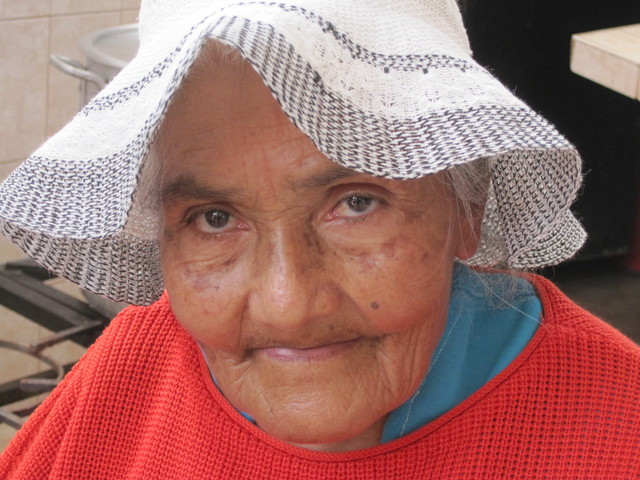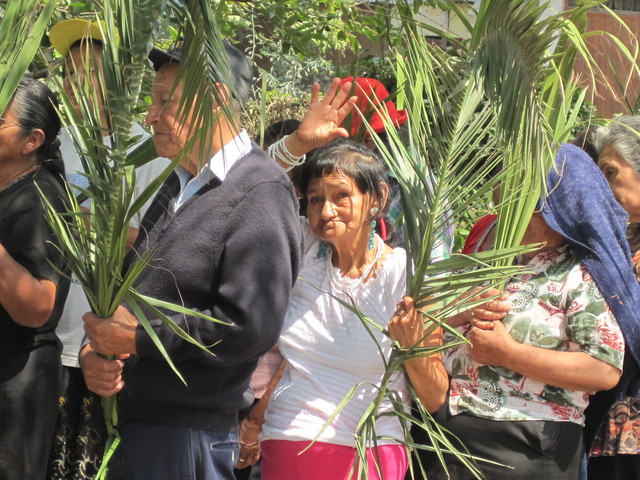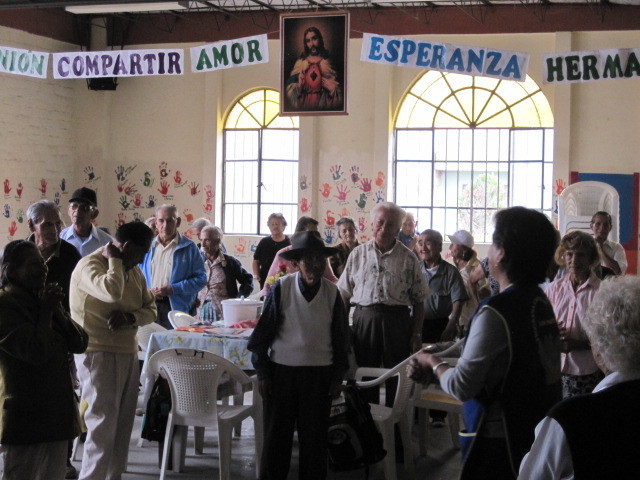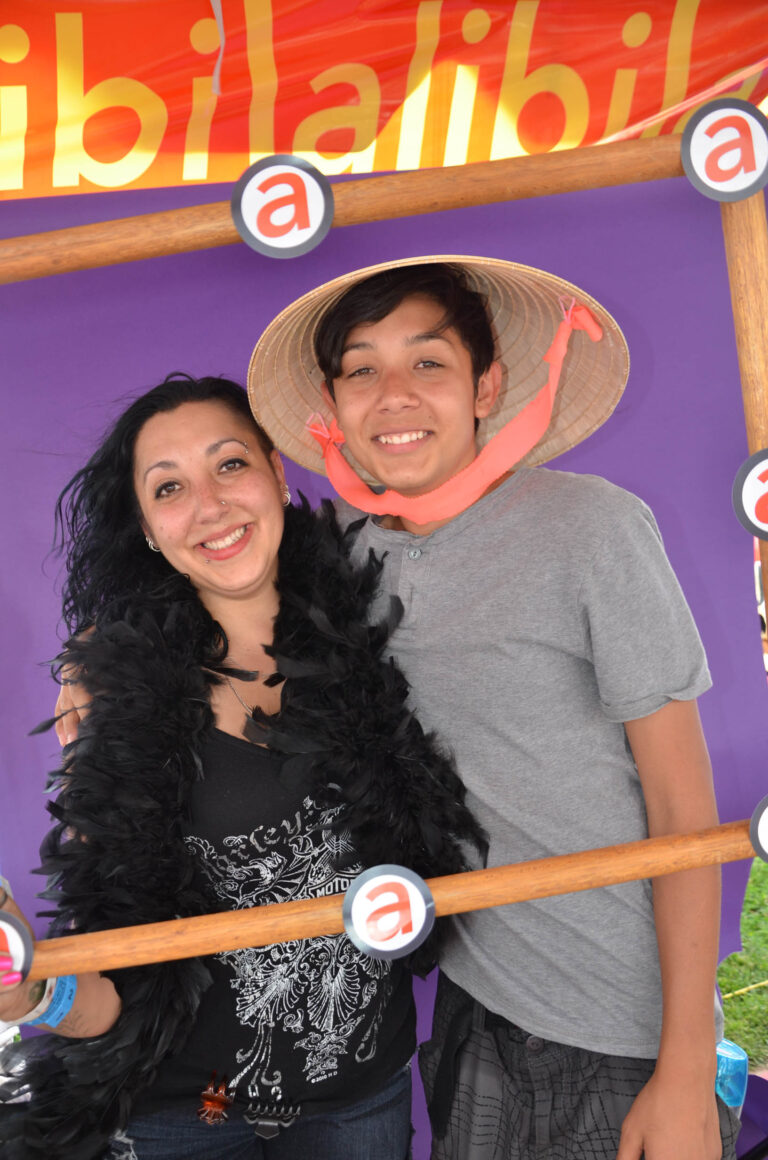My volunteer assignment in the Villa El Salvador area of Lima is twofold. The first part is working at Los Martincitos, a community-based initiative sponsored by the Catholic Church. Three times a week—on Mondays, Wednesdays and Fridays—up to 130 poor senior citizens who are eligible for the program receive two hot meals, recreational activities, organized prayer, basic health care and the opportunity to socialize with others, something that many of them never get to do. To be eligible, one must be at least 65 years ol, and live below the poverty line of $2 a day for a family of four. (The "absolute poverty" line is $1 a day for a family of four.)The participants of this program face different challenges: neglect on the part of their families, physical abuse, poor health and nutrition levels, inability to adapt to their environment, and social rejection for racial and age reasons.The abuelos , as they are referred to ("grandparents" in Spanish), are incredibly affectionate and grateful to the voluntarios who help with their program. They hug and kiss us and greet us with an enthusiastic “¡Buena dia!" every morning upon our arrival. This is one of the best parts of my day. They love having their pictures taken, and I love taking pictures of them. I have attached some photos of my new "grandparents."None of the abuelos speak English. Some don’t even speak Spanish, but instead speak Quechua, the language of the indigenous people of Peru. It is very difficult to understand them no matter what language they speak, because most of them have no teeth and have no resources to visit a dentist. Some are almost blind but cannot afford glasses. Some are in need of medical care but can’t afford to go to a doctor, or are too sick to get there. I suspect that some eat almost nothing on the days of the week that the senior center is not open. They wear mismatched and ill-fitting clothing that was acquired through donations. They always try to look their best, although it is difficult to wash one’s clothing, not to mention one’s self, when you live in a small shack with no running water. But they are always happy despite their hardships, and are a joy to be around.My duties consist of visiting with the abuelos (talking to them in my broken Spanish, or communicating in other ways when language is a barrier), assisting in their recreational activities, and helping to prepare, serve and clean up after two 100-person meals each day. All meals are made from fresh ingredients in a small kitchen on the premises. My knife skills have improved considerably in the two weeks I have been here, as I am learning through many blisters what it takes to prepare two meals from scratch within hours for 100 people. I finally understand what a non-native-speaking immigrant kitchen worker in a restaurant feels like. I AM that person on the days I work in la cocina. Breakfast consists of porridge and a roll with some sort of modest sandwich filling. (Yesterday the filling was sangre , which is cooked blood. Ingesting blood seems to be a theme in my life lately.) Lunch is rice with different types of Peruvian stews, usually made with potatoes or beans. A fruit or vegetable is also included at lunch. At Los Martincitos, they try to use the healthiest ingredients that the limited funds will allow because these meals are the only nutrition that some of the abuelos get. The dishes from each meal (100 plates, 100 cups, 100 bowls, and all serving containers) are washed in three small basins of cold water, with an assembly line of volunteers wiping, washing, rinsing and drying. No water is wasted, as the leftover dishwater is used to water a few fruit trees on the property which help feed the abuelos during harvest time. No food is ever wasted, as anything leftover from the meals goes to those who were not able to attend that day. Once a month, the abuelos receive a small ration of dried beans and rice that the government provides to the center.Between breakfast and lunch, the seniors engage in a variety of activities, such as arts and crafts, physical therapy, games, exercise, dancing, or visiting a nurse who is onsite once a week. Sometimes volunteers will give haircuts, as well shaves for the men and manicures for the women. I participate in one or more of these activities each day with the abuelos . In arts and crafts, some of the women make earrings out of small beads, which they sell for two sols (the currency of Peru), or the equivalent of 60 cents. The first time I helped in physical therapy, the real physical therapists, who volunteer their time as well, taught me how to give a therapeutic massage and then let me, with very little supervision, work on abuelos with various muscle and joint problems. Apparently I have cured a lot of aliments (or at least have gotten no complaints so far), and I am a certified terapico fisico in the eyes of my patients. Perhaps a career in massage therapy is in my future if the Alibi doesn’t take me back after my mission ends. 🙂Before lunch, the abuelos gather for prayer. Since the program is sponsored by the Catholic Church, religion plays a big part in it, although one need not be Catholic to attend. Because Los Martincitos is not open on weekends, we celebrated Palm Sunday last Monday. All of the abuelos were given palms fronds, and we walked in a large procession through the streets of Villa el Salvador, singing hymns to "El Padre." We wheeled those who couldn’t walk in wheelchairs. It was very touching, and I felt proud to be a part of it. I have attached a photo of this as well.The second part of my volunteer assignment is to go on home visits. These visits are the most interesting, and at times, the most heartbreaking part of my job. More to come.
Read the rest of the blogs in this series here.











